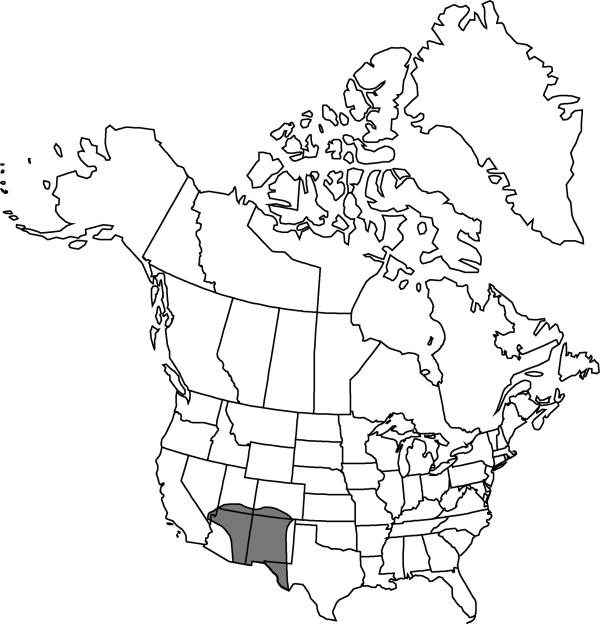Difference between revisions of "Mirabilis oxybaphoides"
in W. H. Emory, Rep. U.S. Mex. Bound. 2(1): 173. 1859.
imported>Volume Importer |
GeoffLevin (talk | contribs) m (Edited synonyms to match printed version) |
||
| Line 13: | Line 13: | ||
|publication_title=Amer. J. Sci. Arts, ser. | |publication_title=Amer. J. Sci. Arts, ser. | ||
|publication_place=2, 15: 320. 1853 | |publication_place=2, 15: 320. 1853 | ||
| − | }} {{Treatment/ID/ | + | }} |
| + | |synonyms={{Treatment/ID/Synonym | ||
|name=Allionia oxybaphoides | |name=Allionia oxybaphoides | ||
|authority=(A. Gray) Kuntze | |authority=(A. Gray) Kuntze | ||
|rank=species | |rank=species | ||
| − | | | + | }} {{Treatment/ID/Synonym |
| − | + | |name=Allioniella oxybaphoides | |
| + | |authority=(A. Gray) Rydberg | ||
}} | }} | ||
| − | |||
|hierarchy=Nyctaginaceae;Mirabilis;Mirabilis sect. Oxybaphoides;Mirabilis oxybaphoides | |hierarchy=Nyctaginaceae;Mirabilis;Mirabilis sect. Oxybaphoides;Mirabilis oxybaphoides | ||
|hierarchy_nav=<div class="higher-taxa"><div class="higher-taxon"><small>family</small>[[Nyctaginaceae]]</div><div class="higher-taxon"><small>genus</small>[[Mirabilis]]</div><div class="higher-taxon"><small>section</small>[[Mirabilis sect. Oxybaphoides]]</div><div class="higher-taxon"><small>species</small>[[Mirabilis oxybaphoides]]</div></div> | |hierarchy_nav=<div class="higher-taxa"><div class="higher-taxon"><small>family</small>[[Nyctaginaceae]]</div><div class="higher-taxon"><small>genus</small>[[Mirabilis]]</div><div class="higher-taxon"><small>section</small>[[Mirabilis sect. Oxybaphoides]]</div><div class="higher-taxon"><small>species</small>[[Mirabilis oxybaphoides]]</div></div> | ||
| Line 46: | Line 47: | ||
|rank=species | |rank=species | ||
|parent rank=section | |parent rank=section | ||
| − | |synonyms= | + | |synonyms=Allionia oxybaphoides;Allioniella oxybaphoides |
| − | |basionyms=Quamoclidion | + | |basionyms=Quamoclidion oxybaphoides |
|family=Nyctaginaceae | |family=Nyctaginaceae | ||
|phenology=Flowering spring–fall. | |phenology=Flowering spring–fall. | ||
Latest revision as of 20:26, 7 December 2022
Stems decumbent to prostrate, often tangled in other vegetation, 2–12 dm, herbaceous, puberulent in lines or throughout, glandular or not. Leaves spreading; petiole 0.5–3.5 cm; blade broadly deltate or ovate, 1.5–8 × 1–7.5 cm, fleshy, base cordate, apex usually acute or acuminate (rounded), surfaces glabrous or pubescent, and then often glandular. Inflorescences loosely and narrowly cymose; involucres solitary or clustered at ends of branches, or solitary in axils, 5–9 mm, lobes triangular, base 50–70% of height. Flowers 3 per involucre; perianth purplish to pale pink (white), 0.5–0.9 cm. Fruits olive, dark brown and black-mottled, or evenly black, sometimes faintly marked with 5 shallow grooves, broadly obovoid to nearly spheric, 2.5–3.5 mm, smooth or slightly rugose. 2n = 60.
Phenology: Flowering spring–fall.
Habitat: Brush or boulders, banks in woodlands, moist areas
Elevation: 1400-2600 m
Distribution

Ariz., Colo., Nev., N.Mex., Okla., Tex., Utah, Mexico (Chihuahua, Coahuila, Nuevo León).
Discussion
Selected References
None.